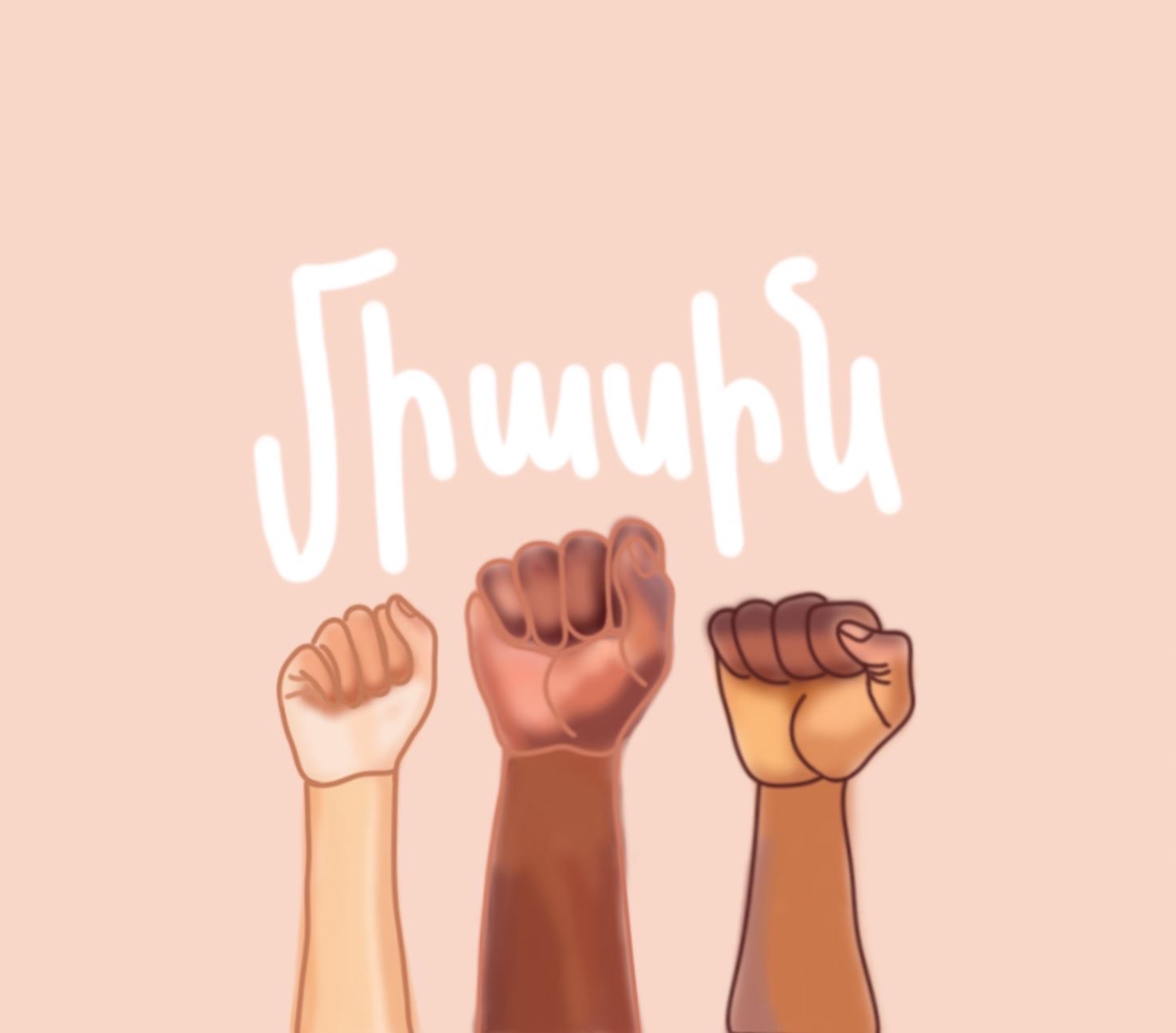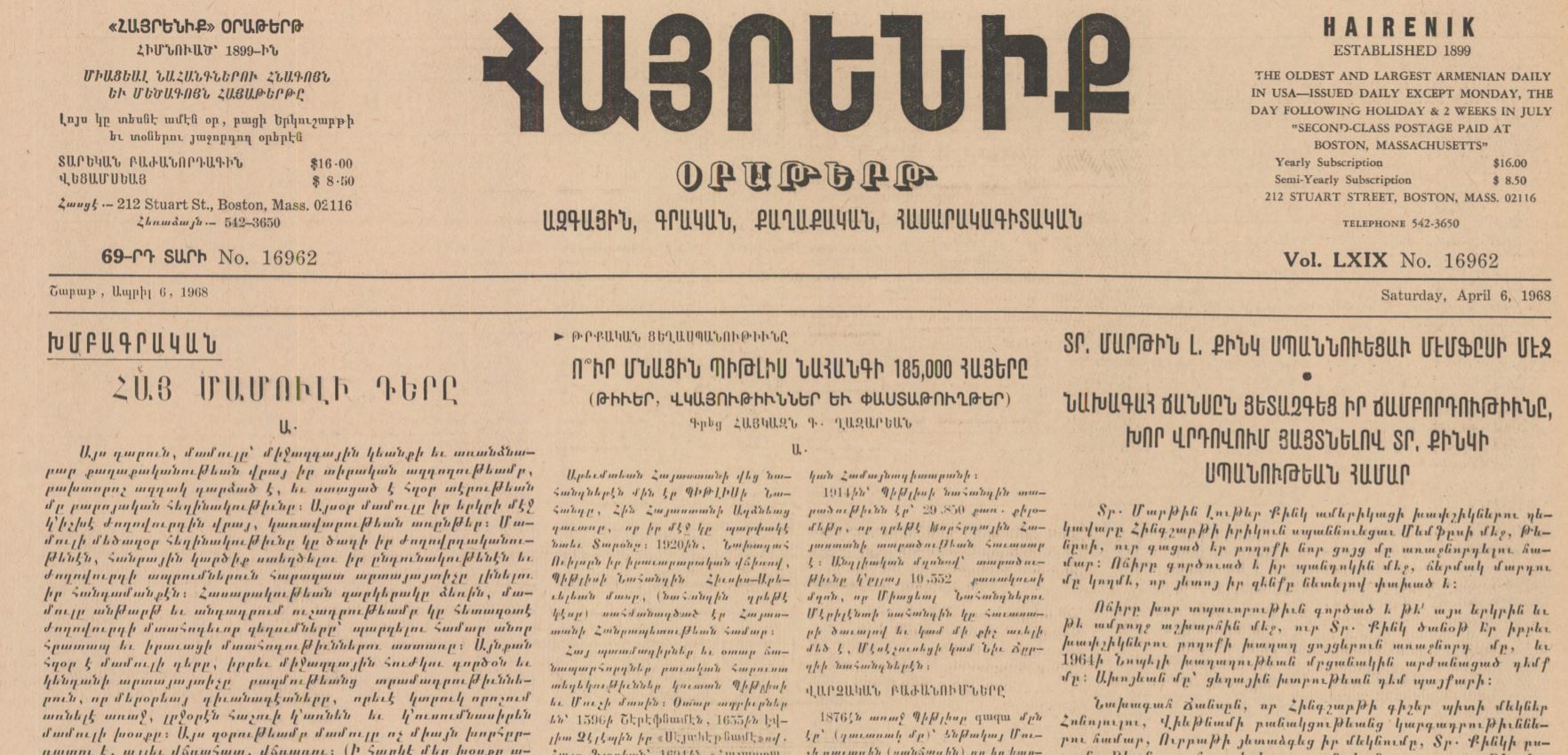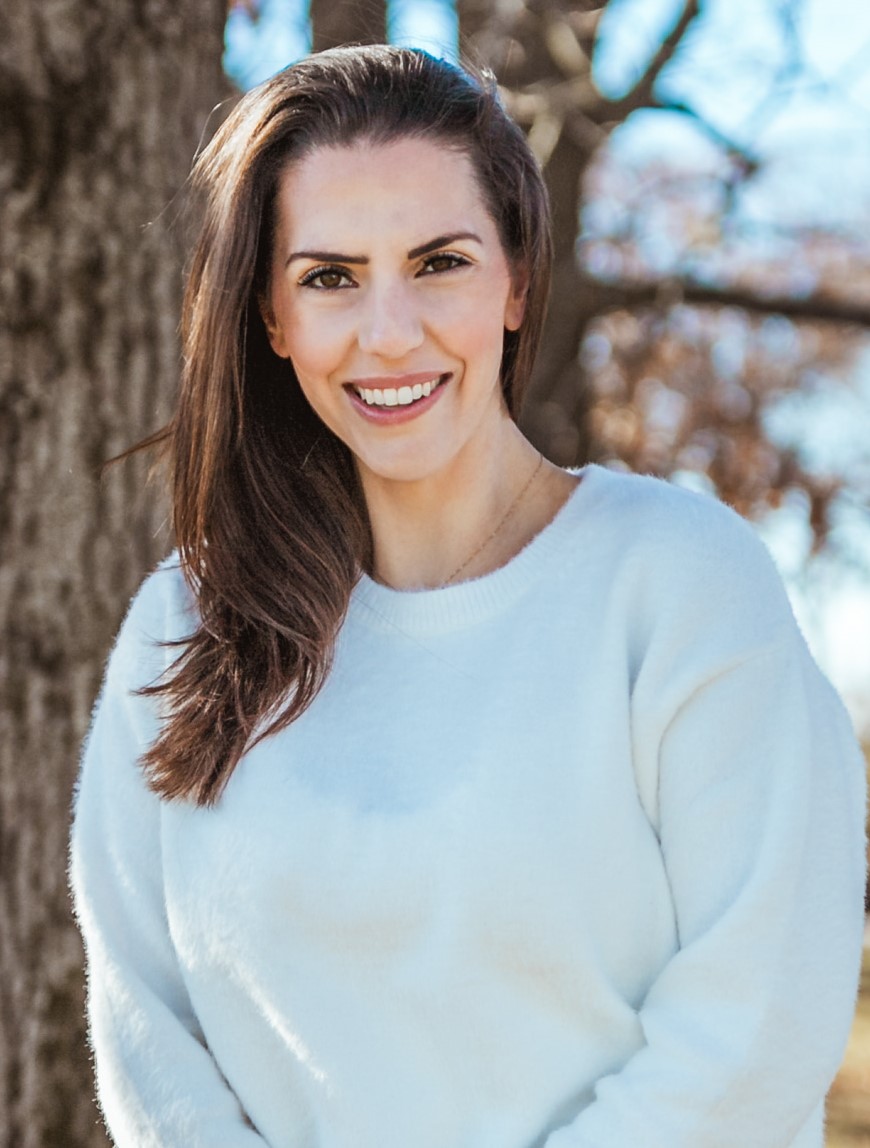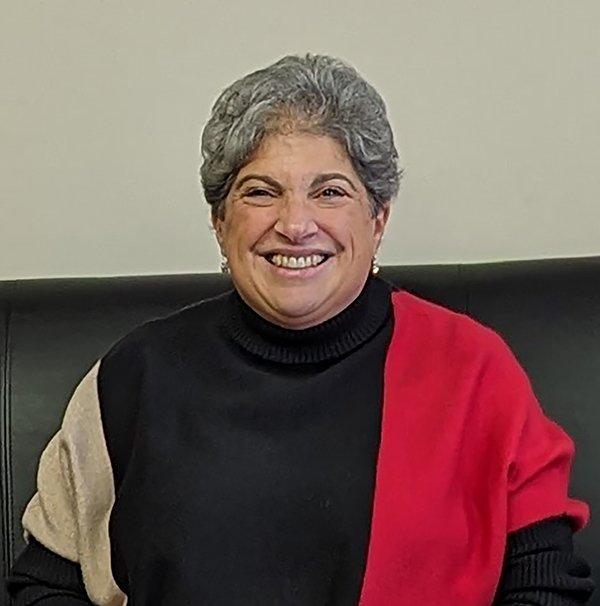
Silence is dangerous. As Armenian Americans and the current leaders of this historic publication, we feel an urgent need to address the heartbreaking events that have been unfolding across our country in the aftermath of yet another deadly example of systemic racism, police brutality and the tragic murder of George Floyd.
With our sights set on the motivation and message behind the awe-inspiring, peaceful demonstrations, we ask you, dear reader, what does the death of an unarmed black man mean for us as Armenians? Why is it so important that we, as informed Diasporan Armenians in the US, join this discussion surrounding racism? Does it directly affect our daily lives, and whether we believe it does or not, why document this event in the pages of the Armenian Weekly?
For those who disagree with our editorial decision to spill ink in the name of an African American whose last moments on this complicated earth will forever be ingrained with his cries for mercy and the image of his face sandwiched between a Minneapolis pavement and the senseless leaden knee of a white police officer, please remember our roots as a publication that has long stood up for the most vulnerable in our society and has refused to ignore social injustice in whatever ugly form that it has taken in US history.
In the May 9, 1992 issue of the Armenian Weekly, longtime My Turn columnist Harut Sassounian authored “Armenian Community Should Help Victims of Los Angeles Riots.” “Armenians must understand the value of getting involved in local matters, otherwise unrelated to them, as a way of building bridges of friendship,” Sassounian wrote, encouraging the community to act on the basis of humanity amid widespread and deadly unrest after the Rodney King trial verdicts. In that same issue, there was an article by Aram Kouyoumdjian that assessed the concerns of Armenian business owners picking up the pieces after the riots. Rewind two decades to the front page of the April 6, 1968 issue of the Hairenik Daily, and you will find the headline and news story announcing the assassination of Dr. Martin Luther King, Jr.

Unfortunately, as Armenians, we too have a history of oppression as our ancestors endured the devastation of genocide, and to this day, descendants fight for justice against its chronic denial. We also know the continuing subjugation of our people in Turkey. For these reasons and the simple fact that we are human beings, it is important that we examine what we can do as Diasporan Armenians living in the US to prevent these divisive outcomes or at the very least, ensure that they have a space in this publication.
The very nature of our work is embedded in activism, and activism requires action. This past week, both of our regional AYF organizations issued statements of solidarity and illustrated graphics that resonated with thousands of people, but also angered many in the community. Our news judgment takes the pulse of the Diaspora, and based on the disturbing feedback that we have observed, shallow sentiments and myopic viewpoints do nothing but weaken our cause in finding common ground with victims of oppressed minority groups who are crying out for justice as well.
We don’t need to wait for the situation to escalate and get personal for us to enter the conversation, because then and only then is it an Armenian story. No. We can get angry before something tangible that represents our history and our culture is violated (a khachkar in Colorado). The entire international community is responding to the killing of George Floyd and the racial injustices that have come before him and will come after him. We hope you are as uncomfortable as we are right now, because the dignity of human life is at stake here.
This is also a time for empathy, a lesson in life for our young children—the sheltered ones who grow up in homogeneous schools learning our history, speaking and writing our language, eating lunch with classmates who look just like them. They will eventually be old enough to enter more diverse communities. As their mentors, we are responsible for mitigating the culture shock by having honest conversations about acceptance sooner rather than later. One of us is the mother of a young professional successfully working in her chosen field and the other is the mother of an inquisitive and loving young boy. One of us is starting the conversation about race in her home by discussing racial differences in a positive way with age-appropriate literature highlighting compelling examples of friendship and kindness. One of us, while considering herself an activist and ally, continues to learn from her daughter who actively educates herself about issues surrounding race so she can serve as a true ally and active anti-racist in her community.
Listening to people of color in our communities and hearing their experiences with a sincere desire to learn and understand should be natural for us as descendants of an oppressed people for centuries. It’s time we walk beside our neighbors and offer them the microphone so their voices can be heard. After all, we are all together on this journey known as the human race, and at the end of the day, we all bleed red.




Excellent article. Thank you for speaking up.
Beautifully said. And thank you for the Armenian history in the US reaching to Dr. King’s assassination. We need to build more bridges and extend an open hand and heart. Walls and a myopic attitude won’t get us far.
Great article. Thank you.
It is way past time for we, as Armenians (at least many Armenians), to show empathy and compassion toward other groups other than us who have been discriminated against. For too long, we have sought support from other groups for recognition of the Armenian Genocide without also seeking to denounce the persecution and bigotry directed against black and brown people in the US and throughout the world. I hope this is finally changing. The lacking Armenian voice and advocacy for too long is frankly shameful. I hope this article is the impetus for widespread change of attitudes and advocacy among Armenians who have not yet extended their compassion to our other brothers and sisters.
Thank you for speaking up. Shad shnorhagel em.
Thank you for this article. Racism and silence in the face of injustice must be called out in our community.
wow !!! this was so powerful, the best article of an Armenian journalist I have read for the las many-many years – thank you Leeza and Pauline, aprek !!!
Good job in raising an issue we Armenians often waver on. In many ways, we resemble the Israeli government and its hypocrisy in recognizing the Genocide. As descendants of a people subjected to the worst form of racism, we tend to ignore others who have also experienced it. Neither me nor my children have personally gone through the Genocide, yet the trauma of my grandparents has been passed down to us. It’s the same with the African-American community. Brought over as slaves, treated like animals, sold as commodities, then segregated and lynched for their God-given skin color by supposedly God-fearing whites, these injustices have become part of their psyche the same way the Genocide has become part of ours. It is my wish that we Armenians begin viewing the events following the death of George Floyd through that prism, and hopefully, realize that they are not much different from us. That will be the ultimate measure of our humanity.
Thank you for this terrific article.
Those “many in the community” are either unaware or oblivious that the Armenian-American community also had a checkered history when it comes to discrimination and segregation. Three names come to mind: Halladjian, Cartozian, Fresno. Do your homework, learn your ancestors’ past, and then get angry for the right reasons.
I have waited all my life to start reading work of Armenians in the United States…like THIS. Thank you. It is time. It is past time. I am so very grateful. I’m actually crying. God bless!!!
Thank you, Armenian Weekly, Leeza Arakelian and Pauline Getzoyan for this insightful and timely exchange with Armenians. Certainly our own history teaches us vigilance and responsibility to feel and act as citizens of the world fighting against all and every injustice that humiliates, abuses and kills. George Floyd and all other black lives matter to us even more so because we know what persecution, hatred and racism mean. Our legacy should empower and enlighten future generations in taking actions in the name of our humanity.
How many times in the past 40 years have I approached my fellow Armenians about the importance of brotherly love, compassion, and friendship with all our neighbors? Friendship? In principle-maybe, in actuality-rare, and in reality-often met with racist references, despite a past of tragedy, which we should have related to. I do thank one kind shepherd-our brother Manoog Kaprielian from Providence.
As someone who has dedicated her life to ethnic esteem and brotherhood in children through the multicultural arts, I find it strange that only now are people jumping on the bandwagon of social justice and equity. Bottom line? Practicing the bonding path of familial friendships produces an open heart, which no amount of book reading can yield. If so moved, you can donate to our work as we celebrate our 40th Year Birthday, on our website: http://www.ethnicartscenter.org Thank you!
Thank you, Leeza and Pauline, for this impassioned and deeply personal editorial. You speak for so many of us!
I’m not in full agreement with those ideas, especially because the time of protesting doesn’t give people license for rioting, looting, vandalism and thuggery. Bystander People have been attacked by Thugs concealing themselves inside Protester Crowds.
I haven’t seen much talk about Tony Timpa, in Texas, who died under similar circumstances (under the knee of a policeman), in 2016. Tony, a 32 year old mentally ill White Male, was off his medication when he called the police for help. Local Security saw him panicking, and put him in handcuffs. The police arrived, applied more restraints, and Tony found himself face-down (in the grass), with an officer’s knee over his neck and shoulder (until the mentally ill man died).
So, is this a question of racism, or is it a question of isolated incidences that demand better police training?
Anyway, I should add one more thing: There’s a strikingly similar parallel between the deaths of George Floyd and Hrant Dink. In both case people came together, in crowds, tp protest and support a long neglected minority group. With George Floyd, Nationwide crowds gathered together to protest for “Black Lives Matter” (BLM); on the other hand, in 2007, crowds gathered together in Istanbul, Turkey, to protest against the killingt of Hrant Dink, and his Armenian Community there,
https://www.youtube.com/watch?v=Dt0rRMeQAaY
https://www.youtube.com/watch?v=_c-E_i8Q5G0&t=3s
Police culture is “tough.”
Toughness can be good given what police have to deal with (murder, rape, domestic abuse, sexual abuse, gangs, etc.), but it has its bad side: Abuse.
Also, police cover for each other. This is well-known.
Police need to be more closely audited, and police complaint files need to be open to everyone and be published when necessary.
Much of police abuse takes place in the big cities run by Democrats. Obviously, they need to do a better job of monitoring the police.
How often do these elected officials in YOUR city or town looked into police files? I bet never.
Have you ever asked them? They’re just a phone call or email away.
Their contact information is on the city or town website.
Maybe this is a task that Armenian American media can take up. Ask the local officials.
How many complaints are there in police files? What are they? Which police officers have had complaints lodged against them?
Police abuse innocent people hundreds of times everyday in this country, against Blacks and Whites alike.
Even in Greater Boston and your hometown they do it. Don’t kid yourself.
Most of those big cities are run by Democrats. So what have they done about it?
People are protesting against as if he is responsible for local police departments.
As for “Black Lives Matter”: of course they matter. All lives do, even those of criminals.
But when we witness Blacks vandalizing and looting Black-owned businesses during these latest “protests”, is that valuing Black lives?
When we see a lot of crime by Blacks against Blacks, is that valuing Black lives?
If you commit violent crime and you wind up in prison, do you value even your own life?
So while we must absolutely stop police abuse, let us think about who does and does not value life.
Sometimes a community must dig its own way out of its predicament. Government can help, but it cannot solve the problem.
One such problem is families without fathers. That’s all I will say.
“We rarely think people have good sense unless they agree with us.”
— La Rochefoucauld
I saw a young man on a street corner here in Lakewood, Colorado holding up a sign “no lives matter until black lives matter”. I’ve been thinking a lot about that. We’ve all been oppressed. The black communities have a 400+ years of slavery and oppression here in the US alone. This all needs to stop. We need to come together, Help reform our government and police forces. This young man’s sign was correct. We’re all human beings having a human experience. We need to step up, speak out and help our world. We all matter. Thank you for reading.
I loved this article. Thank you for speaking out.
Thank you for speaking out Armenian Weekly! Can’t tell you how many “conversations” I have with old and new Armenian friends who seem to have forgotten or never new that our ancestors caused a lot of “good trouble” and were massacred for it. They seemed to have swallowed the current tidal wave of lies and misinformation hook, line and sinker, and just can’t be convinced otherwise. A lost lot I’m afraid. Many of my progressive and all inclusive attitudes were formed in the AYF and ARF and then looking outward and understanding we are part of a larger and long struggle for human rights, dignity and respect! Black Lives Matter!